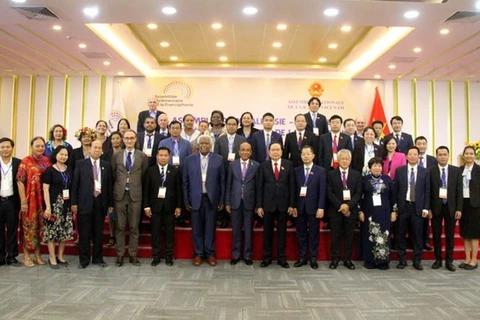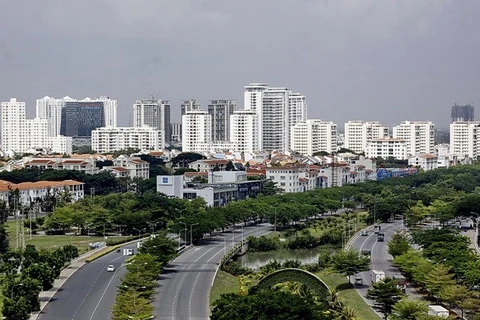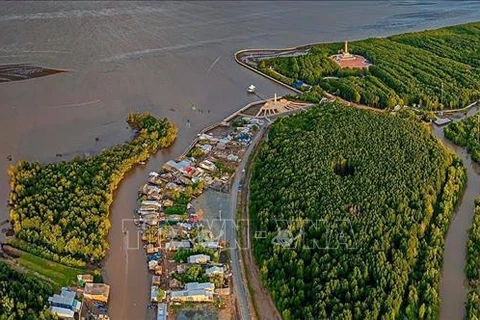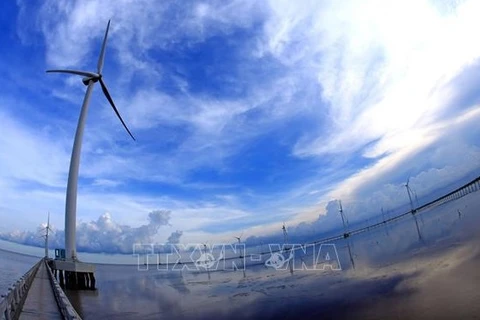Can Tho (VNS/VNA) - About 40% of the Mekong Delta will disappear by 2100 due to a lack of sediment, and overexploitation of sand is to blame.
The alarming data was shared by experts from the World Wide Fund for Nature (WWF) in Vietnam at a recent seminar titled "Sustainable sand management in the Mekong Delta and solutions to the scarcity of sand in the Mekong Delta" in the city of Can Tho.
According to the WWF, overexploitation of sand has exacerbated the effects of climate change and the rise in sea level, especially in the face of riverbank erosion.
The report of the WWF in Vietnam and the General Department of Natural Disaster Prevention and Control under the Ministry of Agriculture and Rural Development showed that landslides have been widespread in the whole delta.
On average, each year, the Mekong Delta loses about 500ha of land. In the three years from 2018 to 2020, landslides caused more than 200 billion VND (8.4 million USD) in damage to the provinces of An Giang, Dong Thap, Can Tho, Vinh Long and Ca Mau.
The main cause of landslides is the overexploitation of groundwater and the construction of a series of hydroelectric dams upstream, especially the increasing exploitation of river sand. Excessive sand mining also increases the depth of the river bed.
According to Ha Huy Anh, Project Manager of Sustainable Sand Management in the Mekong Delta of the WWF in Vietnam, currently, the volume of sand poured into the Mekong Delta is about 6.18-7 million tonnes per year and about 6.5 million tonnes of sand is poured into the East Sea.
Meanwhile, the amount of sand extracted from rivers in this area is between 28-40 million tonnes per year. This means, every year, the Mekong Delta is experiencing a sand deficit from 27.5 to 39.5 million tonnes. Unsustainable sand mining is having a significant impact on the morphology of the two main rivers in the Mekong Delta, namely the Tien and Hau rivers.
Nguyen Nghia Hung, Deputy Director of the Southern Institute of Irrigation Science, said that riverbed sand is a particularly necessary resource for socio-economic development needs. In particular, in the Mekong Delta, riverbed sand is exploited and used mostly to make construction materials and level the ground. However, at present, the problem of sand mining in this area is facing challenges involving climate change and overexploitation.
According to Hung, there are many research topics on river management planning and irrigation planning. However, not much research is conducted on sustainable sand mining planning.
Recently, the WWF in Vietnam has implemented the Sustainable Sand Management project. The project will be implemented from July 2019 to May 2024 to contribute to maintaining important ecological functions and reducing socioeconomic risks due to climate change in the Mekong Delta.
One of the project's goals is to increase awareness among communities and decision-makers about the impact of unsustainable sand mining, which increases natural disasters in the region, and thereby promote the finding of alternative sources of sand and gravel for construction.
According to the WWF in Vietnam, the project will promote the participation and dialogue among key actors in the Vietnamese construction industry, providing information about the risks related to sand and gravel mining and opportunities for sustainable alternatives to sand and gravel in Can Tho as well as the Mekong Delta.
At the same time, a communication campaign on the impact of unsustainable sand and gravel mining in the Mekong Delta will also be carried out by the WWF to promote urgent action to tackle the problem./.
The alarming data was shared by experts from the World Wide Fund for Nature (WWF) in Vietnam at a recent seminar titled "Sustainable sand management in the Mekong Delta and solutions to the scarcity of sand in the Mekong Delta" in the city of Can Tho.
According to the WWF, overexploitation of sand has exacerbated the effects of climate change and the rise in sea level, especially in the face of riverbank erosion.
The report of the WWF in Vietnam and the General Department of Natural Disaster Prevention and Control under the Ministry of Agriculture and Rural Development showed that landslides have been widespread in the whole delta.
On average, each year, the Mekong Delta loses about 500ha of land. In the three years from 2018 to 2020, landslides caused more than 200 billion VND (8.4 million USD) in damage to the provinces of An Giang, Dong Thap, Can Tho, Vinh Long and Ca Mau.
The main cause of landslides is the overexploitation of groundwater and the construction of a series of hydroelectric dams upstream, especially the increasing exploitation of river sand. Excessive sand mining also increases the depth of the river bed.
According to Ha Huy Anh, Project Manager of Sustainable Sand Management in the Mekong Delta of the WWF in Vietnam, currently, the volume of sand poured into the Mekong Delta is about 6.18-7 million tonnes per year and about 6.5 million tonnes of sand is poured into the East Sea.
Meanwhile, the amount of sand extracted from rivers in this area is between 28-40 million tonnes per year. This means, every year, the Mekong Delta is experiencing a sand deficit from 27.5 to 39.5 million tonnes. Unsustainable sand mining is having a significant impact on the morphology of the two main rivers in the Mekong Delta, namely the Tien and Hau rivers.
Nguyen Nghia Hung, Deputy Director of the Southern Institute of Irrigation Science, said that riverbed sand is a particularly necessary resource for socio-economic development needs. In particular, in the Mekong Delta, riverbed sand is exploited and used mostly to make construction materials and level the ground. However, at present, the problem of sand mining in this area is facing challenges involving climate change and overexploitation.
According to Hung, there are many research topics on river management planning and irrigation planning. However, not much research is conducted on sustainable sand mining planning.
Recently, the WWF in Vietnam has implemented the Sustainable Sand Management project. The project will be implemented from July 2019 to May 2024 to contribute to maintaining important ecological functions and reducing socioeconomic risks due to climate change in the Mekong Delta.
One of the project's goals is to increase awareness among communities and decision-makers about the impact of unsustainable sand mining, which increases natural disasters in the region, and thereby promote the finding of alternative sources of sand and gravel for construction.
According to the WWF in Vietnam, the project will promote the participation and dialogue among key actors in the Vietnamese construction industry, providing information about the risks related to sand and gravel mining and opportunities for sustainable alternatives to sand and gravel in Can Tho as well as the Mekong Delta.
At the same time, a communication campaign on the impact of unsustainable sand and gravel mining in the Mekong Delta will also be carried out by the WWF to promote urgent action to tackle the problem./.
VNA
























